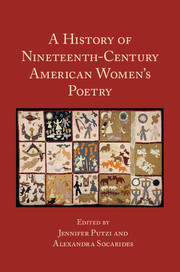Book contents
- Frontmatter
- Contents
- List of Illustrations
- List of Contributors
- Acknowledgments
- Introduction: Making History: Thinking about Nineteenth-Century American Women's Poetry
- PART I 1800–1840, AMERICAN POESIS AND THE NATIONAL IMAGINARY
- PART II 1840–1865, UNIONS AND DISUNIONS
- PART III 1865–1900, EXPERIMENT AND EXPANSION
- 17 Women Poets and American Literary Realism
- 18 Verse Forms
- 19 Braided Relations: Toward a History of Nineteenth-Century American Indian Women's Poetry
- 20 Frances Harper and the Poetry of Reconstruction
- 21 “hear the bird”: Sarah Piatt and the Dramatic Monologue
- 22 Women Writers and the Hymn
- 23 Women Poets, Child Readers
- 24 Emma Lazarus Transnational
- 25 The Creation of Emily Dickinson and the Study of Nineteenth-Century American Women's Poetry
- Suggested Further Reading
- Index
24 - Emma Lazarus Transnational
from PART III - 1865–1900, EXPERIMENT AND EXPANSION
Published online by Cambridge University Press: 21 January 2017
- Frontmatter
- Contents
- List of Illustrations
- List of Contributors
- Acknowledgments
- Introduction: Making History: Thinking about Nineteenth-Century American Women's Poetry
- PART I 1800–1840, AMERICAN POESIS AND THE NATIONAL IMAGINARY
- PART II 1840–1865, UNIONS AND DISUNIONS
- PART III 1865–1900, EXPERIMENT AND EXPANSION
- 17 Women Poets and American Literary Realism
- 18 Verse Forms
- 19 Braided Relations: Toward a History of Nineteenth-Century American Indian Women's Poetry
- 20 Frances Harper and the Poetry of Reconstruction
- 21 “hear the bird”: Sarah Piatt and the Dramatic Monologue
- 22 Women Writers and the Hymn
- 23 Women Poets, Child Readers
- 24 Emma Lazarus Transnational
- 25 The Creation of Emily Dickinson and the Study of Nineteenth-Century American Women's Poetry
- Suggested Further Reading
- Index
Summary
Emma Lazarus's Statue of Liberty poem, “The New Colossus,” stands out as one of the few texts by a nineteenth-century woman to have remained in circulation after the death of its author. It defies long-held assumptions about women's writing: it is not domestic, it is not private, it is not psychological or directly biographical or confessional. These categories mark the continued force of what in the nineteenth-century itself was called the “woman's sphere,” the “narrow circle” Alexis de Tocqueville described American women to inhabit. “The New Colossus” is a directly public poem, projecting a vision of America original to Lazarus herself: not only is the nation made up of plural identities, but being American means being multiply constituted.
This multiplicity is registered in the poem's own textuality. The representation of America as archetypal hostess offering “world-wide welcome” to the “homeless” registers Lazarus's own gendered identity. Indeed, it presents a gendered America in the image of the female benevolent societies that served the poor and the immigrant throughout the century.
A mighty woman with a torch, whose flame
Is the imprisoned lightning, and her name
Mother of Exiles. From her beacon-hand
Glows world-wide welcome; her mild eyes command
The air-bridged harbor that twin cities frame.
This “mighty woman” is directly contrasted with the Greek brazen male Colossus, posing his conquering gigantism against her specifically feminized, restrained strength, rendered through a series of oxymora: imprisoned/lightning, Mother/exiles, mild eyes/command, cries/silent lips, indeed mighty/woman itself. But woven through this feminized America are other identities: obviously the varied “masses” who are here incorporated into American life as its very purpose, but also Lazarus's own particular identity as a Jew. Reflecting the Hebrew Lazarus was then studying, the poem braids events of Jewish history into the very fabric of American history. The “mighty woman with a torch” recalls Deborah as “eshet lapitdoth,” the “woman” of the “torch” whose husband was named “Barak,” meaning lightning. “Mother of Exiles” evokes Rachel weeping for her children. The concluding lifted “lamp” correlates with a series of lamps in Lazarus poems associated with the Maccabees, who, in defense of the existence of their own ethnic culture, rebelled against the Greeks – against whom America too has been contrasted in the opening lines, thus aligning America itself with ethnic difference, not in mutually exclusionary ways but rather as negotiated multiplicity.
- Type
- Chapter
- Information
- A History of Nineteenth-Century American Women's Poetry , pp. 390 - 405Publisher: Cambridge University PressPrint publication year: 2016



